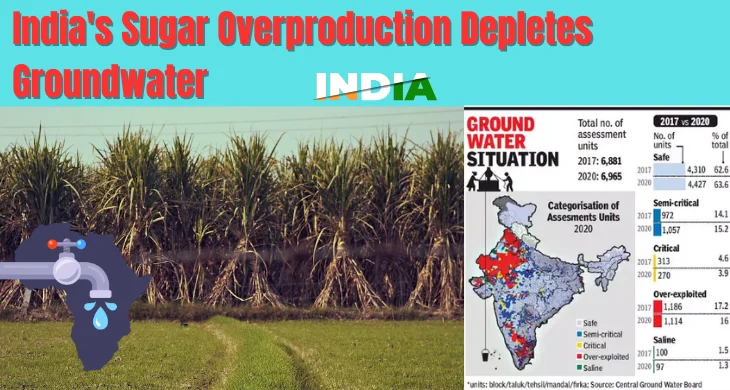In the land of a million flavors, India, the sweetness of sugar is being offset by a bitter reality. The nation’s excessive sugar production is exacting a heavy toll on its invaluable groundwater reserves. As sugarcane cultivation flourishes, so does the demand for water, guzzling this precious resource at an alarming rate. This introduction delves into the intricate connection between India’s sugar surplus and the depleting groundwater levels, shedding light on the impending challenges and the pressing need for sustainable solutions. Join us as we uncover the story behind the bittersweet impact of sugarcane farming on India’s groundwater resources.
Status of Sugarcane Sector in India:
The status of the sugarcane sector in India is a complex tapestry of both opportunity and challenge. On one hand, India stands as one of the world’s largest producers of sugarcane, contributing significantly to the global sugar market. The country’s vast agricultural landscape, diverse agro-climatic conditions, and a vast pool of skilled labor all favor the growth of sugarcane.However, this promising picture is not without its shadows. The sugarcane sector faces several critical issues, including cyclical price fluctuations, delayed payments to farmers, overreliance on water resources, and environmental concerns. The sugar industry is also closely intertwined with the political landscape, with sugarcane farmers often wielding significant influence.
In recent years, the Indian government has introduced various policy measures to address these challenges and promote sustainable sugarcane cultivation. Initiatives such as the Sugarcane Control Order, Minimum Support Price (MSP) mechanism, and the promotion of ethanol production from sugarcane have all aimed at achieving a better balance in the sector.The status of the sugarcane sector in India is, therefore, a mix of its critical role in the country’s agriculture and economy, alongside the need for careful management and sustainability to ensure the well-being of both farmers and the environment. The sector’s future hinges on finding innovative and sustainable solutions to the challenges it faces.
Factors Behind Excess Sugar Production:
The factors behind excess sugar production are multi-faceted and often interlinked. Several key drivers contribute to this surplus in the sugar industry:
- Cultivation Expansion: The increasing acreage under sugarcane cultivation is a primary factor. As farmers expand their fields to meet the growing demand, the production capacity also surges.
- Government Support: Government policies, subsidies, and incentives provided to sugarcane farmers and the sugar industry can stimulate production. Minimum Support Price (MSP) mechanisms and other forms of support can encourage farmers to grow more sugarcane.
- Climate and Agro-climatic Conditions: Favorable weather conditions and diverse agro-climatic zones in India create an environment conducive to sugarcane growth. This results in higher yields and production.
- High Sucrose Varieties: The adoption of high sucrose-yielding sugarcane varieties contributes to increased sugar content in the crop, further boosting production.
- Market Demand: The demand for sugar, especially in the food and beverage industry, remains substantial. This encourages producers to meet the market’s needs, often leading to excess production.
- Profitability and Price Cycles: Sugarcane cultivation can be profitable, and price cycles can incentivize farmers to increase production during periods of higher prices.
Impact and Consequences:
The impact and consequences of excessive sugar production are wide-ranging and can significantly affect various aspects of the economy, society, and the environment. Some key impacts and consequences include:
- Groundwater Depletion: Excessive sugarcane cultivation demands a substantial amount of water, leading to the depletion of groundwater resources. This can result in water scarcity and adversely affect the availability of water for other uses, such as drinking and irrigation.
- Environmental Degradation: The overuse of water for sugarcane cultivation can harm the environment. It can lead to soil erosion, reduced biodiversity, and the contamination of water bodies due to the runoff of pesticides and fertilizers.
- Economic Stress on Farmers: Farmers may face economic stress when there is an oversupply of sugarcane. This can lead to lower prices for their produce, delayed payments, and increased indebtedness.
- Delayed Payments: Delayed payments by sugar mills to farmers have been a persistent issue in the sugar industry. This can create financial burdens on farmers and impact their livelihoods.
- Price Volatility: Excess sugar production can lead to price volatility in the sugar market. When there is an oversupply, prices can plummet, affecting the profitability of the sugar industry.
Impact of Excessive Sugarcane Cultivation on Groundwater:
The impact of excessive sugarcane cultivation on groundwater is a pressing concern with far-reaching consequences. Here’s a closer look at the repercussions:
- Groundwater Depletion: Sugarcane is a water-intensive crop, and excessive cultivation leads to the over-extraction of groundwater. This depletes aquifers and lowers the groundwater table, making it more challenging to access this vital resource.
- Water Scarcity: As sugarcane farming consumes vast quantities of water, it can exacerbate water scarcity in regions already grappling with insufficient water resources. This affects not only agriculture but also drinking water supply and other essential needs.
- Environmental Impact: Overuse of groundwater for sugarcane cultivation can harm the environment. It can lead to soil erosion, reduce soil fertility, and impact the health of water bodies due to the runoff of chemicals and fertilizers used in farming.
- Delayed Payments to Farmers: The financial stress on sugar mills due to excess production can result in delayed payments to sugarcane farmers. This can lead to economic hardships for farmers and affect their livelihoods.
- Economic Consequences: An oversupply of sugarcane can result in lower prices for the produce, impacting the profitability of the sugar industry. It can also lead to price volatility in the sugar market.
- Sustainability Concerns: In the pursuit of higher yields, sustainable agricultural practices may be compromised. This can have long-term implications for the sustainability of agriculture in affected regions.
Challenges and Concerns:
The challenges and concerns stemming from excessive sugarcane cultivation are multifaceted and require careful consideration:
- Groundwater Depletion: Excessive sugarcane farming places immense pressure on groundwater resources, depleting aquifers and lowering water tables. This results in water scarcity, affecting not only agriculture but also drinking water supply and other vital needs.
- Environmental Degradation: The overuse of water, along with the application of pesticides and fertilizers, can lead to soil erosion and contamination of water bodies. This harms the environment, reducing biodiversity and affecting the health of ecosystems.
- Economic Stress on Farmers: The sugar industry’s cyclical price fluctuations can lead to economic stress on sugarcane farmers. Oversupply can depress prices, causing financial hardship and increased indebtedness.
- Delayed Payments: Delayed payments by sugar mills to farmers have been a persistent issue in the industry. This impacts farmers’ livelihoods and financial stability.
- Price Volatility: Excess sugar production can lead to price volatility in the sugar market. Oversupply can depress prices, affecting the profitability of the sugar industry.
- Sustainability Challenges: The pursuit of higher yields sometimes comes at the expense of sustainable agricultural practices. This can have long-term sustainability implications for agriculture and the environment.
Addressing the Problem of Imbalanced Incentives:
- Recognizing the Issue: Acknowledge the imbalance in incentives that currently favor sugarcane cultivation at the expense of other crops, resulting in its excessive production.
- Introducing Comprehensive Subsidy Programs: Implement fair and comprehensive subsidy schemes aimed at diversifying crop cultivation. These initiatives will promote a more balanced and equitable approach, discouraging monocultures and ensuring that farmers receive a fair income regardless of the crop they choose to cultivate.
- Encouraging Crop Diversification:Promoting Crop Variety: Actively encourage farmers to diversify their crop choices, reducing their overreliance on water-intensive crops such as sugarcane.
- Equitable Income Generation: Highlight the financial advantages of cultivating a diverse range of profitable crops, which can alleviate resource strain and enhance sustainability, while reducing the burden on groundwater resources.
- Embracing Environmentally Responsible Farming Practices:Efficient Irrigation Methods: Promote the adoption of water-efficient irrigation techniques like drip irrigation, which can significantly reduce water consumption (up to 70%) compared to traditional flood irrigation.
- Mandatory Implementation with Support: Enforce the mandatory use of drip irrigation systems in targeted regions and provide financial incentives to support their setup.
- Implementing Water Conservation and Management Systems:Rainwater Harvesting Promotion: Encourage rainwater harvesting practices to supplement water supply, especially during periods of scarcity.
- Wastewater Utilization: Explore the use of treated wastewater for agricultural irrigation, reducing the reliance on groundwater sources.
- Efficient Canal Irrigation Networks: Develop and expand efficient canal irrigation networks to ensure more sustainable water distribution, benefitting a broader agricultural area.
- Enhancing Groundwater Research and Management:In-Depth Research and Mapping: Invest in comprehensive research and mapping to gain a better understanding of groundwater availability and distribution patterns.
- Science-Based Policy Formulation: Use accurate data to formulate science-based policies for effective groundwater management, ensuring that decisions align with sustainability goals.
- Making Sustainability a Priority:Core of Agricultural Practices: Emphasize sustainability as a central tenet of India’s agricultural practices, ensuring that economic growth is harmonized with environmental responsibility.
FAQS:
1. Why is sugarcane cultivation impacting groundwater in India?
Excessive sugarcane cultivation requires vast amounts of water, leading to the depletion of groundwater reserves.
2. How does this impact the environment?
Overuse of groundwater for sugarcane farming can result in soil erosion, reduced soil fertility, and contamination of water bodies due to chemical runoff.
3. What are the economic implications of overproducing sugar?
Oversupply can lead to price volatility in the sugar market, impacting the profitability of the sugar industry and causing delayed payments to sugarcane farmers.
4. How is the government addressing this issue?
The government is exploring policy measures, including promoting alternative uses for sugarcane, implementing water-saving technologies, and encouraging crop diversification.
5. Are there any sustainable alternatives to sugarcane production?
One alternative is the production of ethanol from sugarcane, which can help manage excess cultivation and support the renewable energy sector.
6. What can farmers do to reduce their impact on groundwater?
Farmers can adopt water-efficient agricultural practices, such as drip irrigation, and diversify their crop choices to reduce reliance on water-intensive crops.
Conclusion:
The path to a sustainable future lies in balanced incentives and comprehensive subsidy programs that encourage crop diversification, promoting a variety of profitable crops that alleviate resource strain. Environmentally responsible practices, such as drip irrigation and wastewater utilization, can significantly reduce the burden on groundwater resources.Efforts to enhance canal irrigation networks and expand rainwater harvesting initiatives are integral to more sustainable water distribution. Groundwater research and data-driven policy formulation are essential for science-based groundwater management.
Sustainability must be embedded at the core of India’s agricultural practices, harmonizing economic growth with environmental responsibility. With the collaboration of farmers, communities, organizations, and consumers, India can work towards a future where sugar production coexists with the preservation of groundwater, ensuring a more balanced and resilient agricultural landscape.




